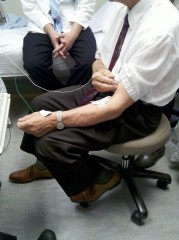I missed the deadline to submit my preference for where I wanted to do my Family Medicine clerkship. Fortunately, though, my first choice was an away rotation at a hospital near my parents’ house.
On my first day of Family Medicine clinic, I was scheduled to work with Dr. C, a senior resident. Before seeing my first patient, we talked about how things were done in clinic. We looked at the list of patients scheduled for the afternoon. We discussed the chief complaints that these patients had reported when making the appointment.
Dr. C asked me what rotations I had already been on. He asked me if I was familiar with different physical exam maneuvers. He graduated from a different school than I attend so he wasn’t too sure how much to expect of me.
While we were talking the medical assistant roomed a patient. I didn’t notice this. I didn’t even know what to look for. But Dr. C did. And as he wrapped up, he finished with, “Well the best way to find out where you are and how much you know is to just send you in. So go see the first patient.”
And that was that. I went to see the patient. I took a history and performed a physical exam. When I came out I told Dr. C what the chief complaint was and what my physical exam findings were. He asked me questions about the patient. I apologized for not thinking of asking for that information.
I’ve decided that the third year is full of these moments where I feel like I’m just thrown into the deep end of the pool. It is a state of almost constant unpreparedness. It was the same way when I started my Pediatrics rotation. I started on the Pediatric Pulmonary team. During our first full week the service was swamped with patients. They gave each student 5 patients to take care of.
Two weeks into Pediatrics I was sitting at lunch with 3 other classmates. Every single one of us felt overwhelmed. We each felt like we didn’t know what we were doing; it was like a mean prank where they throw you into a game without the instruction booklet.
But maybe it works. Maybe the constant feeling of not knowing quite enough is what pushes us through the fatigue and the strain to keep reading. Maybe we have to feel like we know nothing in order to push harder. Maybe this is one of those “refiner’s fire” types of situations that will mold is into competent physicians.
Sure. I can accept that. Why not?
Bring on the wolves.









